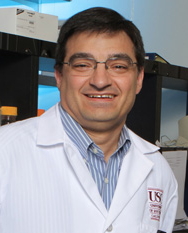
Targeting Protein-Protein Interactions with Engineered Cyclotides
Julio Camarero
Professor, University of Southern California
Cyclotides are a new emerging family of large plant-derived backbone-cyclized polypeptides (?28-37 amino acids long) that share a disulfide-stabilized core (3 disulfide bonds) characterized by an unusual knotted. Cyclotides contrast with other circular poylpeptides in that they have a well-defined three-dimensional structure, and despite their small size, can be considered as miniproteins. The main features of cyclotides are therefore a remarkable stability due to the cystine knot, a small size making them readily accessible to chemical synthesis, and an excellent tolerance to sequence variations. For example, the first cyclotide to be discovered, kalata B1, is an orally effective uterotonic, and other cyclotides have been shown to cross the cell membrane through macro-pinocytosis. Cyclotides thus appear as promising leads or frameworks for design of peptide-based diagnostic and therapeutic compounds. I will present new data on the biosynthesis of cyclotides using bacterial and yeast expression systems for the generation of large genetically-encoded cyclotide-based libraries for high throughput cell-based screening and selection of cyclotides with novel biological activities. We will also report the design and biosynthesis of a MCoTI-grafted cyclotide with the ability to target protein-protein interactions in vivo, as well as modified cyclotides with improved cellular uptake properties.
Professor Camarero started his studies in chemistry at the University if Barcelona (Spain), received his Master degree in 1992, and finished his PhD thesis there in 1996. Afterwards he joined the group of Professor Tom W. Muir at The Rockefeller University as a Burroughs Wellcome Fellow where he contributed to the development of new chemoselective ligation techniques for the chemical engineering of proteins. In 2000, he moved to the Lawrence Livermore National Laboratory as a Distinguished Lawrence Fellow where he became staff scientist and head of laboratory in 2003. He finally joined the University of Southern California in 2007 as an associate professor. His current research interests are focused in the development of new bioorganic approaches using protein splicing and synthetic protein chemistry for studying biological processes involved in bacterial pathogenicity and how can be modulated or inhibited by small molecules. Professor Camarero has authored over 70 peer-reviewed publications and four invited book chapters.